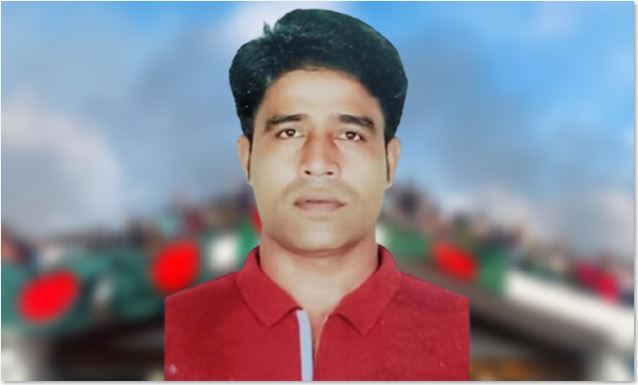
By Ismail Ahsan
DHAKA, June 16, 2025 (BSS) – “Today is Hasina’s last day”, were the final words Zobayer Bepari told his wife before stepping out to protest on July 19; hours later, he was lying in a pool of blood, gunned down in Uttara, never to return to the sons who now cry at his grave.
On the evening of July 19, Zobayer Bepari (42), a key figure of the July Anti-Discrimination Student Movement in Uttara, was fatally shot in the back near the Bangladesh-Kuwait Friendship Hospital —allegedly by ruling party cadres using police firearms—causing the bullet to pierce through his body and killing him instantly on the blood-soaked street.
The 42-year-old activist had long been involved in movements against political oppression and discrimination. Witnesses say he was leading from the front during the protests that flared up in Uttara during mid-July, demanding justice and democratic reforms.
Despite the horrific violence of the previous day of July 18, when Uttara saw an unprecedented number of protester deaths, Zobayer returned to the streets on July 19, undeterred.
“We had taken control of the Dhaka-Mymensingh highway again around noon,” recalled Talha Zubair Sajib, a 35-year-old textile engineer who was marching alongside Zobayer.
“Just before evening, we were retreating toward the east, near Sector 6, after facing a police and ruling-party chase. Suddenly, a bullet tore through Zobayer from behind and exited through his chest. He collapsed face down—there was blood everywhere,” he said.
“The bullet was fired from the western direction, where police and armed ruling party (Awami league) cadres were advancing. They were using police weapons. That bullet was clearly meant for him”, he added.
Back at home in Dakshinkhan’s Dobadia Bepari Para, the news shattered his wife Chand Moni, who had been married to Zobayer for seven years. “He always jumped into protests,” she said through tears. “From the very first day of this movement on July 4, he was in the streets daily. He would come home full of emotion and tell me everything.”
The couple has two sons—Zayan (6) and Rayan (4). “Our wedding anniversary was only days away. Now I am a widow at 23,” said Chand Moni. “My sons don’t understand. The little one goes to his grave and cries, ‘Baba, wake up! Mama is crying.’ What should I tell them?”
She recalled her last conversation with Zobayer. “It was around 5:30pm. My brother-in-law then called to say he had been shot. I assumed it was rubber pellets, like many others who were injured the day before. I didn’t even tell my in-laws at first because they were sick. We went to the hospital later—by then, he was gone.”
Zobayer’s elderly parents, Abdus Sabur Bepari (76) and Amena Begum (70), are shattered by the loss. “He always took me for treatment,” said his father. “He wasn’t just a son—he was my strength. Who will stand beside me now? Who will take me to the doctor?”
The grieving father believes his son was deliberately targeted due to local political conflicts. “The followers of former MP Habib Hasan and Khasru Chowdhury killed my son,” he claimed. “They harassed us over land disputes. Zobayer always resisted. That resistance cost him his life.”
He also mentioned Zobayer’s political affiliation. “He was associated with BNP’s Swechhasebak Dal. That made him a bigger target.”
Once a businessman, Zobayer had suffered losses in the automobile trade and had recently invested in an excavator to support his family.
Zobayer Bepari’s father, Abdus Sabur Bepari, confirmed that the family has filed a case, accusing 186 individuals in connection with his son’s death. “We have named everyone responsible,” he said with tearful resolve. “My son was targeted and killed—this was not an accident. I want justice for my child, and I want to see it in my lifetime.”
July 18 and 19 marked two of the bloodiest days in Uttara’s history, as protesters and civilians came under coordinated attack. Multiple eyewitnesses allege that former MP Habib Hasan’s son, Abir Hasan Tamim, and his brother, Alaudin Sohel, were seen leading armed groups who repeatedly attacked protesters. Journalists have preserved video footage from those incidents.
Local residents have since put up banners bearing Zobayer’s smiling face, mourning the loss of a man they describe as their “sun-bright son.” His story, however, remains largely unacknowledged in mainstream narratives.
At dusk, while returning from Zobayer’s home, this reporter saw one such banner fluttering gently in the fading light—his gentle smile now a haunting symbol of sacrifice.